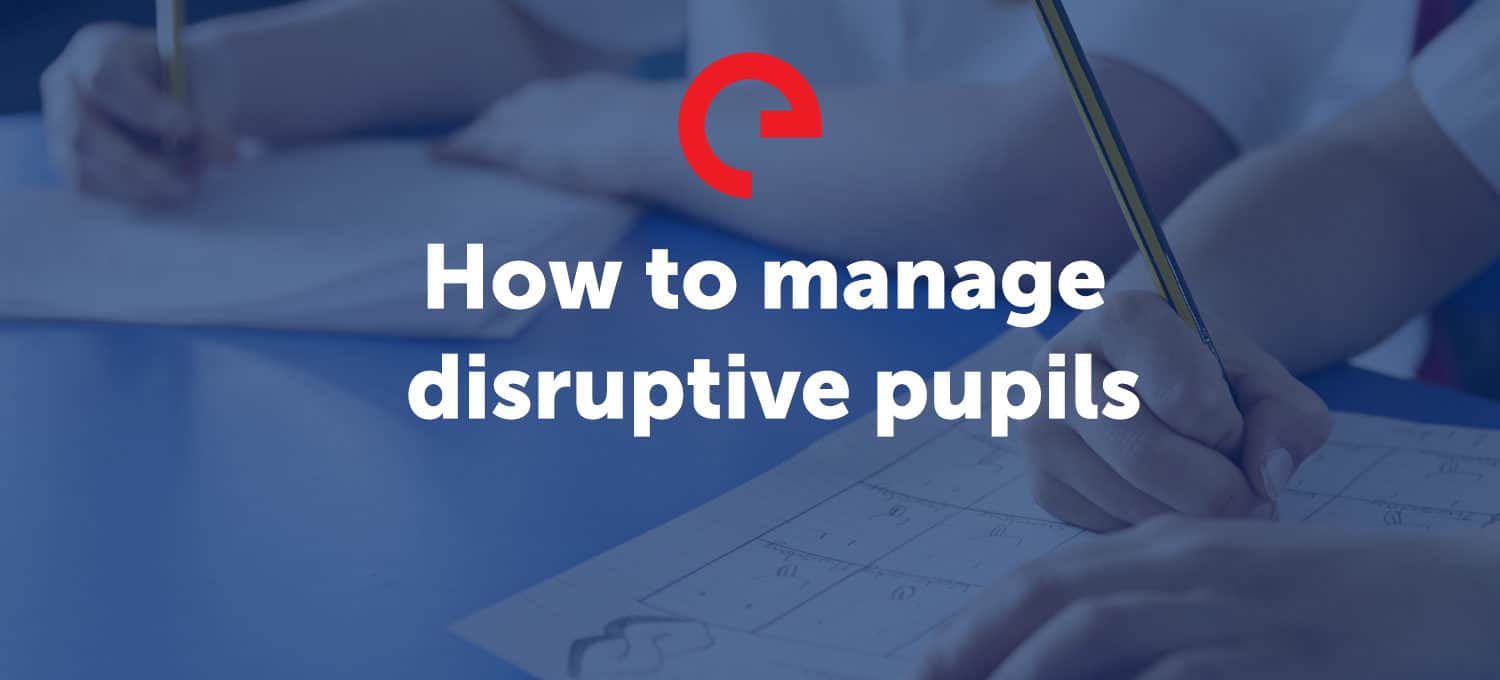
11th September 2019
How to manage disruptive pupils
It is important to manage disruptions in your classroom – or to get out ahead of them with preventative methods where possible – as disruptions can severely damage pupil learning for the whole class, and leads to frustration and stress for you if they take hold.
However, some teachers can find themselves at a loss when faced with disruptive pupils, so we’ve compiled a few tips and resources to help you on your way to getting on top of any disruption in your classroom.
What is classroom disruption?
There are two broad kinds of classroom disruption, low-level disruption and high-level disruption.
Low-level disruption is characterised as unauthorised talking, moving around the classroom, calling out instead of raising their hand, and other behaviour that can disrupt the entire classroom if left unchecked.
High-level disruption, however, is characterised by behaviour that undermines you as a teacher and the entire learning process, such as challenges to your authority, outright refusal to obey rules, answering back, and/or verbal abuse of you or another pupil. This behaviour is immediately disruptive in this first instance and needs to be dealt with straight away.
How can I manage classroom disruption?
Reflect
Reflection is a useful tool for teachers in all situations, and behaviour and disruption management is no exception. In reflection, you might find that your current approach to behaviour management can be adapted or improved to be more effective.
Ask yourself the following questions:
- Do you have a set plan to tackle disruption before it occurs?
- Are you reactive or proactive when it comes to disruption?
- Do you ignore disruption and attempt to just continue on with your lesson?
- Do you shout, scream, or otherwise display anger?
- Do you threaten consequences and actions but fail to follow through?
Once you know what your approach to disruption management is, you’re already in a better position to improve it by highlighting where you think the gaps are and using your skills as a teacher to fill them.
Act
The National Union of Teachers (NUT) has set out some helpful key ideas about behaviour management, which they have called the ‘CASPER’ approach.
- Calm – Always appear calm even when you don’t feel calm. Take a deep breath and create thinking time before reacting.
- Assertive – Maintain eye contact and state your needs clearly using ‘I’ statements such as “I need you to…”
- Status Preservation – Pupils in a school are operating within a peer group, so when you correct their behaviour you should be aware of this and use private reprimands
- Empathy – Be empathetic towards your pupils and avoid challenge questions such as “what do you think you are doing?”
- Respect – Respect your pupils even if they are disrespectful to you in order to model the behaviour you expect from them
Some methods you can use to maintain control:
- Make sure lessons are engaging
- Cater for different learning styles, abilities, and concentration capabilities
- Ensure inappropriate behaviour is dealt with consistently
- Use an appropriate voice volume for the situation, and never shout in anger
- Give praise and positive encouragement to individual pupils whenever possible
Whole-school approach
Pupil behaviour isn’t just the responsibility of the individual teacher. Your school will have a behaviour policy in place that sets out the expectations for pupils, and all teachers and faculty should be consistent in its implementation.
If you feel that there are inconsistencies in applying the behaviour policy which is undermining your ability to control your classes, you should bring it up with your mentor or senior colleagues.
What next?
Remember that no matter how difficult you find a disruptive situation, you are not alone. Every teacher struggles from time to time with classroom disruptions, and the senior leaders at your school are there to help you in every way they can. If you still find that you are finding it hard to cope even with the support of your school, you can call the Education Support Partnership at any time on 0800 0562 561 to receive specialist support and counselling.
Our Partnership & Development team run CPD sessions on a variety of topics including behaviour management, throughout the year. Our CPD sessions are designed for teachers to learn from education experts and former senior leadership on best practices, and also a great opportunity to network with other teachers. Read more about teacher CPD here.
If you’re looking for a new position in education to continue your work in making a real difference to the attainment of pupils, register with us and our team of consultants will be able to find you a role that matches your ambitions.
Book a consultation call with Engage!
Book a consultation call with us to discover how Engage Education can support you!
Book a call!Recommended for you
Top 5 questions to ask at the end of a teacher interview
An interview for a teaching role can often be a daunting prospect...
- Your Career
- •
- 3 Min Read
Celebrating St. Patrick’s Day In The Classroom
Dia Duit! The 17th of March is St. Patrick's Day in the...
- Your Career
- •
- 3 Min Read
Ways to support your students during Ramadan
What is Ramadan? Ramadan, the ninth month of the Islamic calendar has...
- Your Career
- •
- 3 Min Read


